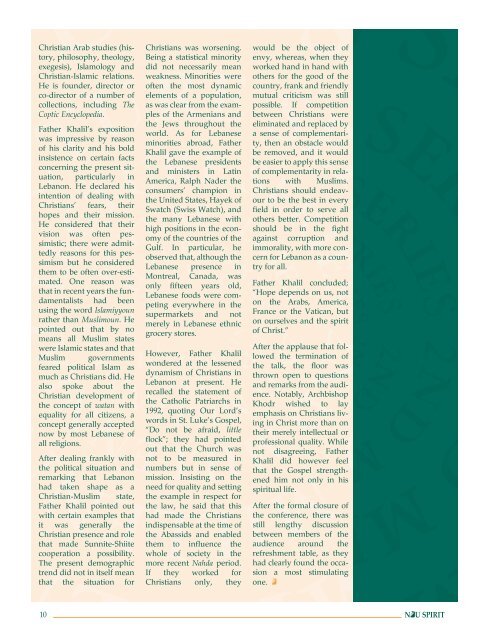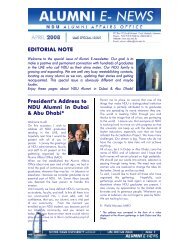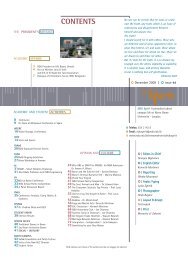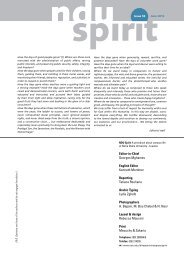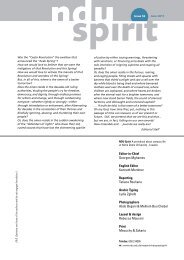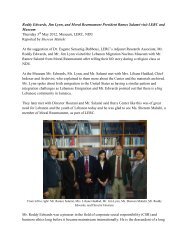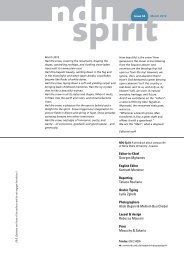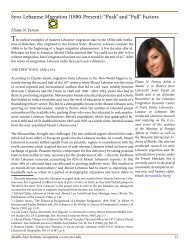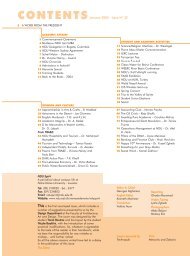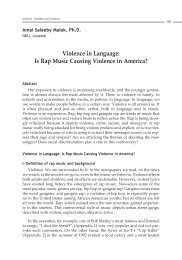OUTLINE - Notre Dame University
OUTLINE - Notre Dame University
OUTLINE - Notre Dame University
Create successful ePaper yourself
Turn your PDF publications into a flip-book with our unique Google optimized e-Paper software.
Christian Arab studies (history,<br />
philosophy, theology,<br />
exegesis), Islamology and<br />
Christian-Islamic relations.<br />
He is founder, director or<br />
co-director of a number of<br />
collections, including The<br />
Coptic Encyclopedia.<br />
Father Khalil’s exposition<br />
was impressive by reason<br />
of his clarity and his bold<br />
insistence on certain facts<br />
concerning the present situation,<br />
particularly in<br />
Lebanon. He declared his<br />
intention of dealing with<br />
Christians’ fears, their<br />
hopes and their mission.<br />
He considered that their<br />
vision was often pessimistic;<br />
there were admittedly<br />
reasons for this pessimism<br />
but he considered<br />
them to be often over-estimated.<br />
One reason was<br />
that in recent years the fundamentalists<br />
had been<br />
using the word Islamiyyoun<br />
rather than Muslimoun. He<br />
pointed out that by no<br />
means all Muslim states<br />
were Islamic states and that<br />
Muslim governments<br />
feared political Islam as<br />
much as Christians did. He<br />
also spoke about the<br />
Christian development of<br />
the concept of watan with<br />
equality for all citizens, a<br />
concept generally accepted<br />
now by most Lebanese of<br />
all religions.<br />
After dealing frankly with<br />
the political situation and<br />
remarking that Lebanon<br />
had taken shape as a<br />
Christian-Muslim state,<br />
Father Khalil pointed out<br />
with certain examples that<br />
it was generally the<br />
Christian presence and role<br />
that made Sunnite-Shiite<br />
cooperation a possibility.<br />
The present demographic<br />
trend did not in itself mean<br />
that the situation for<br />
Christians was worsening.<br />
Being a statistical minority<br />
did not necessarily mean<br />
weakness. Minorities were<br />
often the most dynamic<br />
elements of a population,<br />
as was clear from the examples<br />
of the Armenians and<br />
the Jews throughout the<br />
world. As for Lebanese<br />
minorities abroad, Father<br />
Khalil gave the example of<br />
the Lebanese presidents<br />
and ministers in Latin<br />
America, Ralph Nader the<br />
consumers’ champion in<br />
the United States, Hayek of<br />
Swatch (Swiss Watch), and<br />
the many Lebanese with<br />
high positions in the economy<br />
of the countries of the<br />
Gulf. In particular, he<br />
observed that, although the<br />
Lebanese presence in<br />
Montreal, Canada, was<br />
only fifteen years old,<br />
Lebanese foods were competing<br />
everywhere in the<br />
supermarkets and not<br />
merely in Lebanese ethnic<br />
grocery stores.<br />
However, Father Khalil<br />
wondered at the lessened<br />
dynamism of Christians in<br />
Lebanon at present. He<br />
recalled the statement of<br />
the Catholic Patriarchs in<br />
1992, quoting Our Lord’s<br />
words in St. Luke’s Gospel,<br />
“Do not be afraid, little<br />
flock”; they had pointed<br />
out that the Church was<br />
not to be measured in<br />
numbers but in sense of<br />
mission. Insisting on the<br />
need for quality and setting<br />
the example in respect for<br />
the law, he said that this<br />
had made the Christians<br />
indispensable at the time of<br />
the Abassids and enabled<br />
them to influence the<br />
whole of society in the<br />
more recent Nahda period.<br />
If they worked for<br />
Christians only, they<br />
would be the object of<br />
envy, whereas, when they<br />
worked hand in hand with<br />
others for the good of the<br />
country, frank and friendly<br />
mutual criticism was still<br />
possible. If competition<br />
between Christians were<br />
eliminated and replaced by<br />
a sense of complementarity,<br />
then an obstacle would<br />
be removed, and it would<br />
be easier to apply this sense<br />
of complementarity in relations<br />
with Muslims.<br />
Christians should endeavour<br />
to be the best in every<br />
field in order to serve all<br />
others better. Competition<br />
should be in the fight<br />
against corruption and<br />
immorality, with more concern<br />
for Lebanon as a country<br />
for all.<br />
Father Khalil concluded;<br />
“Hope depends on us, not<br />
on the Arabs, America,<br />
France or the Vatican, but<br />
on ourselves and the spirit<br />
of Christ.”<br />
After the applause that followed<br />
the termination of<br />
the talk, the floor was<br />
thrown open to questions<br />
and remarks from the audience.<br />
Notably, Archbishop<br />
Khodr wished to lay<br />
emphasis on Christians living<br />
in Christ more than on<br />
their merely intellectual or<br />
professional quality. While<br />
not disagreeing, Father<br />
Khalil did however feel<br />
that the Gospel strengthened<br />
him not only in his<br />
spiritual life.<br />
After the formal closure of<br />
the conference, there was<br />
still lengthy discussion<br />
between members of the<br />
audience around the<br />
refreshment table, as they<br />
had clearly found the occasion<br />
a most stimulating<br />
one. N<br />
10 NNU SPIRIT


